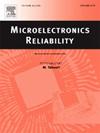阿南德模型参数的变化--如何影响债券的响应?烧结银键的比较研究
IF 1.6
4区 工程技术
Q3 ENGINEERING, ELECTRICAL & ELECTRONIC
引用次数: 0
摘要
有限元分析(FEA)是一种广泛应用的技术,用于模拟电子产品中芯片粘接材料的热诱导机械行为。Anand 统一粘塑性模型通常用于模拟此类互连的机械响应。该模型由九个参数组成,文献中对其各自的影响并不完全清楚。本文旨在通过大量有限元模拟,研究每个阿南德参数对烧结银(Ag)键机械响应的影响。本文利用从文献中获取的烧结银的各种阿南德模型,为每个参数创建了一个系统的研究矩阵。然后将这些材料系数纳入热和热机械模拟,以诱导烧结银键的非弹性变形。根据应力-应变关系、非弹性应变和非弹性应变能量密度对结合层的响应进行分析。结果表明,某些阿南德参数会导致键响应向脆性行为转变,而其他参数则会导致更多的韧性行为。通过统计因子分析发现,每个参数的重要性差异很大,从可以忽略到非常重要。这项研究的结果对于了解各种键合结构的行为及其基于阿南德蠕变常数的预期热疲劳性能非常有价值。此外,本文还为理解阿南德常数的含义及其对任何粘接材料的机械响应的影响奠定了基础,而这在文献中尚未讨论过。本文章由计算机程序翻译,如有差异,请以英文原文为准。
The variation in Anand model parameters – How does that affect the bond's response? A comparative study considering sintered Ag bonds
Finite element analysis (FEA) is a widely used technique for simulating the thermally induced mechanical behavior of die bonding materials in electronics. The Anand unified viscoplasticity model is commonly employed to simulate the mechanical responses of such interconnections. This model comprises nine parameters, the individual effects of which are not fully understood in the literature. This paper aims to investigate the impact of each Anand parameter on the mechanical response of sintered silver (Ag) bonds through extensive finite element simulations. Various Anand models for sintered Ag, sourced from literature, are utilized to create a systematic study matrix for each parameter. These material coefficients are then incorporated into thermal and thermomechanical simulations to induce inelastic deformations in the sintered Ag bonds. The bonding layer response is analyzed in terms of stress-strain relationships, inelastic strains, and inelastic strain energy density. The results indicated that certain Anand parameters could cause the bond response to shift towards brittle behavior, while others could result in a more ductile behavior. Using statistical factorial analysis, it is found that the significance of each parameter varied greatly, from negligible to highly significant. The findings of this study are valuable for understanding the behavior of various bonds configurations and their expected thermal fatigue performance based on their Anand creep constants. Additionally, this paper lays the groundwork for understanding the meaning of Anand constants and their influence on the mechanical response of any bond material which is not discussed in literature yet.
求助全文
通过发布文献求助,成功后即可免费获取论文全文。
去求助
来源期刊

Microelectronics Reliability
工程技术-工程:电子与电气
CiteScore
3.30
自引率
12.50%
发文量
342
审稿时长
68 days
期刊介绍:
Microelectronics Reliability, is dedicated to disseminating the latest research results and related information on the reliability of microelectronic devices, circuits and systems, from materials, process and manufacturing, to design, testing and operation. The coverage of the journal includes the following topics: measurement, understanding and analysis; evaluation and prediction; modelling and simulation; methodologies and mitigation. Papers which combine reliability with other important areas of microelectronics engineering, such as design, fabrication, integration, testing, and field operation will also be welcome, and practical papers reporting case studies in the field and specific application domains are particularly encouraged.
Most accepted papers will be published as Research Papers, describing significant advances and completed work. Papers reviewing important developing topics of general interest may be accepted for publication as Review Papers. Urgent communications of a more preliminary nature and short reports on completed practical work of current interest may be considered for publication as Research Notes. All contributions are subject to peer review by leading experts in the field.
 求助内容:
求助内容: 应助结果提醒方式:
应助结果提醒方式:


